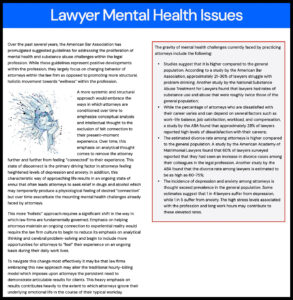ADA Accommodations for Attorneys
The Americans with Disabilities Act (ADA) is a critical piece of legislation that protects employees with disabilities, ensuring they receive fair treatment in the workplace. For attorneys working in high-pressure environments, especially common within Big Law settings, clinical depression and anxiety can significantly impair their ability to perform their job. In addition to providing specialized psychotherapy to attorneys, Mike Lubofsky also works with law firms to create healthier environments that benefit both attorney and law firm bottom line – for more information, we invite you to visit www.lawfirmwellness.com.
The ADA and Reasonable Accommodations
 The ADA requires employers to provide reasonable accommodations to qualified employees with disabilities unless doing so would cause undue hardship to the employer. Reasonable accommodations are modifications or adjustments to the job or work environment that enable an employee with a disability to perform the essential functions of their job.
The ADA requires employers to provide reasonable accommodations to qualified employees with disabilities unless doing so would cause undue hardship to the employer. Reasonable accommodations are modifications or adjustments to the job or work environment that enable an employee with a disability to perform the essential functions of their job.
Key Statutory Requirements Under the ADA
1. Definition of Disability
Under the ADA, a disability is a physical or mental impairment that substantially limits one or more major life activities. Clinical depression and anxiety, when they significantly impair major life activities such as working, can qualify as disabilities.
2. Qualified Individual
A qualified individual is someone who, with or without reasonable accommodation, can perform the essential functions of the employment position they hold or desire. An attorney who can perform the core duties of their job, given the appropriate accommodations, meets this criterion.
3. Reasonable Accommodation
This includes any change in the work environment or the way things are customarily done that enables an individual with a disability to enjoy equal employment opportunities. Examples may include:
– Flexible work schedules
– Remote work options
– Adjustments to workload or deadlines
– Providing a quieter workspace
– Allowing time off for therapy or medical appointments
4. Undue Hardship
An employer is not required to provide an accommodation that would cause significant difficulty or expense, considering the employer’s size, financial resources, and the nature of its operations.
Applying ADA Requirements to Law Firms
Step-by-Step Process for Attorneys
1. Documentation of Disability
The attorney must provide documentation from a qualified healthcare professional that confirms the diagnosis of clinical depression and anxiety and explains how these conditions limit major life activities. As a licensed psychotherapist and a leading psychotherapist for attorneys throughout the United States, Mike Lubofsky can help provide requisite documentation of disability. In addition, as a licensed attorney, Mike can help navigate the negotiation process with HR to ensure that the attorney receives necessary accommodations which will benefit the attorney, as well as the law firm.
2. Identify Needed Accommodations
The attorney should identify specific accommodations that will help manage their condition. This might involve consulting with their healthcare provider to determine what changes will be most effective.
3. Formal Request
The attorney should submit a formal written request to the law firm’s HR department or designated personnel. This request should:
– Clearly state the nature of the disability
– Explain how the disability impacts job performance
– Specify the requested accommodations and how they will help mitigate the limitations caused by the disability
4. Interactive Process
Engage in an interactive process with the employer. This involves a cooperative dialogue to explore potential accommodations and assess their feasibility. The goal is to find a mutually acceptable solution.
5. Implementation and Monitoring
Once accommodations are agreed upon, they should be implemented promptly. Regular check-ins should be scheduled to ensure the accommodations are effective and make necessary adjustments.
Practical Examples of Reasonable Accommodations for Attorneys
– Flexible Work Hours: Allowing an attorney to start and finish their workday at different times to accommodate therapy sessions or manage peak stress periods.
– Remote Work: Providing the option to work from home, either full-time or on certain days, to reduce stress and create a more manageable work environment.
– Reduced Workload: Temporarily adjusting the number of cases or assignments to allow the attorney to focus on recovery without compromising the quality of their work.
– Quiet Workspace: Offering a private office or a quieter area of the office to minimize distractions and anxiety triggers.
– Extended Deadlines: Granting extensions on deadlines where feasible to help manage stress without affecting the overall workflow of the firm.
Attorneys facing clinical depression and anxiety due to workplace stress have the right to request reasonable accommodations under the ADA. Understanding the statutory requirements and following a structured process can help ensure that these accommodations are granted, allowing the attorney to perform their essential job functions effectively while managing their mental health. Law firms, in turn, benefit from supporting their employees’ well-being, leading to a more productive and positive work environment.
